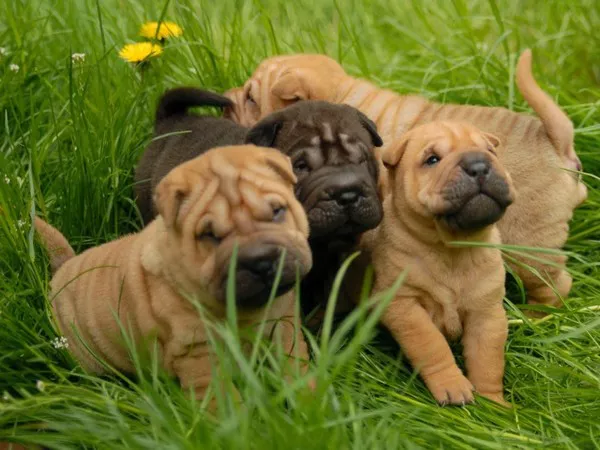As a devoted pet owner, there’s no denying the immense love you have for your Shar Pei. However, despite their adorable wrinkled faces and loyal personalities, you may have noticed an unpleasant smell emanating from your furry companion. The question arises: “Why does my Shar Pei smell so bad?” This article aims to shed light on the various factors contributing to their distinctive odor and provide practical solutions to help you manage and alleviate the issue. By understanding the underlying causes and implementing appropriate strategies, you can ensure your Shar Pei remains a happy and fresh-smelling member of your family.
1. Unique Physiological Traits of the Shar Pei
The Wrinkled Skin Conundrum
Shar Peis are renowned for their wrinkled skin, which adds to their charm. However, these wrinkles can create the perfect environment for trapped moisture, debris, and bacteria, leading to an unpleasant odor. The accumulation of dirt and grime in these folds can cause a condition known as pyoderma, which results in a foul-smelling infection.
2. Coat Type and Grooming Habits
Short, Dense Coat
The Shar Pei’s short, bristly coat is low-maintenance, but it can still be a contributing factor to their distinctive scent. Dead hair, dirt, and oils can accumulate in their coat, leading to an unpleasant odor if not properly managed through regular grooming.
3. Dietary Influences
Digestive Issues
A Shar Pei’s diet plays a significant role in their overall health, including their skin and coat condition. If your furry friend experiences digestive problems or food sensitivities, it can manifest in the form of bad breath and body odor.
4. Skin Health and Infections
Skin Fold Infections
As mentioned earlier, the wrinkles on a Shar Pei’s skin can trap moisture and debris, making them prone to skin fold infections. These infections are often accompanied by a foul odor and can cause discomfort to your beloved pet.
5. Ear Health
Ear Infections
Shar Peis have adorable, floppy ears, but these can create an ideal environment for bacteria and yeast to thrive. Ear infections are not only painful but can also contribute to the overall bad smell of your pet.
6. Dental Hygiene
Bad Breath
Poor dental hygiene can result in bad breath, which can be particularly bothersome when your Shar Pei gets up close and personal with you. Ensuring good dental care is essential for their oral health and can help address this issue.
7. Anal Gland Problems
Foul-Smelling Anal Glands
Like many other dog breeds, Shar Peis have anal glands that produce a distinctive scent. However, when these glands become impacted or infected, they can release an overpowering odor, signaling a potential health issue.
8. Environmental Factors
Contact with Unpleasant Substances
Sometimes, the bad smell on your Shar Pei may be a simple case of rolling in something unsavory during outdoor adventures. Their curious nature might lead them to substances like feces, rotting organic matter, or other strong-smelling substances that cling to their fur.
9. Allergies
Skin and Food Allergies
Shar Peis can be prone to allergies, which can lead to skin irritations and infections. These conditions can contribute to an undesirable odor and require proper medical attention and management.
10. Managing and Reducing Odor in Your Shar Pei
Regular Grooming
Develop a consistent grooming routine to keep your Shar Pei’s coat clean and free of debris. Focus on cleaning the skin folds carefully, ensuring they are dry and free from any trapped dirt or moisture.
A Balanced Diet
Consult with your veterinarian to determine the most suitable diet for your Shar Pei’s specific needs. High-quality dog food can positively impact their overall health, including skin and coat condition.
Maintain Dental Hygiene
Brush your Shar Pei’s teeth regularly and consider providing dental chews or toys to support oral health. Regular dental check-ups with your veterinarian are essential to address any potential dental issues.
Monitor Ear Health
Inspect your Shar Pei’s ears regularly and gently clean them to prevent the buildup of wax and debris. If you notice any signs of infection, seek veterinary attention promptly.
Address Skin Conditions Promptly
If you suspect your Shar Pei has a skin issue or infection, consult your veterinarian immediately for appropriate diagnosis and treatment.
Regular Anal Gland Expression
If your Shar Pei’s anal glands tend to get impacted, consider having them expressed regularly by a veterinarian or a professional groomer.
Environmental Awareness
While it’s essential to provide your Shar Pei with plenty of outdoor playtime and exploration, be mindful of their surroundings to avoid contact with unpleasant substances.
Conclusion
As a responsible pet owner, understanding why your Shar Pei smells bad is crucial in ensuring their health and well-being. By addressing the underlying causes of their distinctive odor and implementing appropriate strategies, you can keep your furry friend fresh-smelling and happy. Remember to seek guidance from your veterinarian if you notice any concerning changes in their odor or overall health. With love, care, and proper attention, your Shar Pei will continue to be the cherished companion you adore.


